In our unsettled world, my wife and I were blessed to spend time over Thanksgiving with our wonderful family – our children and their spouses, and especially our four grandchildren, each of them a unique universe of potential, sources of calm and joy. I hope you had a good holiday.
Nobody Wants This and Intermarried Rabbis
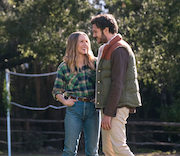 The buzz about “Nobody Wants This” has quieted. My What “Nobody Wants This” gets wrong about interfaith relationships today was featured in The Forward’s November 8 newsletter. Matt Goldberg’s “‘Nobody Wants This’ Is About Beating the Jews” criticizes the series as being “indifferent about Judaism as a religion” and for suggesting that Judaism “isn’t a big deal.”
The buzz about “Nobody Wants This” has quieted. My What “Nobody Wants This” gets wrong about interfaith relationships today was featured in The Forward’s November 8 newsletter. Matt Goldberg’s “‘Nobody Wants This’ Is About Beating the Jews” criticizes the series as being “indifferent about Judaism as a religion” and for suggesting that Judaism “isn’t a big deal.”
On the other hand, in The Times, a major UK newspaper, Jessica Diner, the global beauty director of Vogue, says:
If there is one reason why I am grateful to Nobody Wants This, it is that, at a time when it feels scary to be a Jew, one of the most watched shows on the planet is a story of Jewish love, portrayed by a Jewish actor, written by a Jewish team …. If a Jewish series can give the wider population the warm and fuzzies and deliver a universal message to be open about love while the world feels like it’s on fire, then that, as a Jew, feels incredibly special.
Another UK piece, “How realistic is Nobody Wants This?” asks whether intermarrying rabbis stretches credibility. It notes that the Assembly of Reform Rabbis and Cantors and the Conference of Liberal Rabbis and Cantors in the UK do not bar rabbis with spouses who are not Jewish. Further, Britain’s Progressive seminary, the Leo Baeck College in London, changed its rules more than a decade ago to allow the admission of rabbinic students with partners who are not Jewish.
The rabbi who co-chairs the Reform Assembly, who is 41, says that for her generation of rabbis, having a partner who is not Jewish is “not an issue;” being “strongly committed to the principle of inclusion within the Progressive movement… [i]t would be quite hypocritical to say that rabbis should have a different standard.”
Conservative Movement, Arnold Eisen, Hartman Institute, “Sabbath Queen”
There’s a lot to report about the Conservative movement’s approach to interfaith marriage this month.
The presentation by Rabbi Aaron Brusso mentioned in our October newsletter is definitely worth watching. Rabbi Brusso was the chair of Rabbinical Assembly’s Standards Working Group, which issued a report earlier this year that recommended significant changes that would empower Conservative rabbis to more fully embrace interfaith couples, but maintaining the ban on rabbinic officiation at weddings of interfaith couples.
Rabbi Brusso explains that Conservative rabbis shouldn’t be in the position of disapproving interfaith marriage. Instead, they should embrace interfaith couples pastorally and encourage them to learn about Jewish practices and take responsibility for deciding how they will engage. He explains to couples how the various elements of a halachic Jewish wedding do not fit when one partner is not Jewish; he also explains that the Torah blessings are a particularly Jewish faith statement. I understood him to suggest that after these discussions, the partners from different faith backgrounds are persuaded that it’s not appropriate for them to have a rabbi officiate at their wedding, or for them to say the Torah blessings.
I also led a webinar for 18Doors’ Rukin Fellows. The current cohort, for the first time, has a significant number of Conservative rabbis. Some of them appeared to be very challenged by my “equality theory” – that in order to feel belonging, and therefore engage Jewishly, partners from different faith backgrounds need to be considered and treated as equal to their Jewish partners. I understood one rabbi to say that they were stewards of a two thousand year tradition that couldn’t easily change because of current demographic reality.
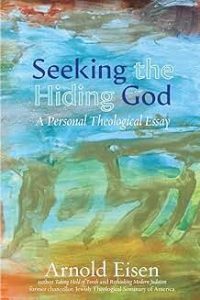 Eisen. Coincidentally, Andy Silow-Carrol interviewed Arnold Eisen, who served as chancellor of the Jewish Theological Seminary, about Eisen’s new book, Seeking the Hiding God. In the interview, Eisen says,
Eisen. Coincidentally, Andy Silow-Carrol interviewed Arnold Eisen, who served as chancellor of the Jewish Theological Seminary, about Eisen’s new book, Seeking the Hiding God. In the interview, Eisen says,
Yes, the number of people who say “I’m a Conservative Jew” is much less than it used to be. I think that is primarily because Conservative rabbis will not perform intermarriages, and if you can’t have a Conservative rabbi [officiate] your wedding and you’re intermarried or the child of an intermarriage, you’re not going to say, “I’m a Conservative Jew.”
Hartman Institute. In a very interesting Shalom Hartman Institute podcast, “Spheres of Belonging,” Yehuda Kurtzer says:
At Hartman we’ve been doing some work on the idea of “Jewish adjacents,” the people connected to Jews and Jewish community and who are themselves not Jewish, and we’ve been asking: what are their responsibilities to our norms when they seek to participate in Jewish life, and what are our ethical obligations to them as players in Jewish life?
How do they add to the richness of our community and how do we make space for their involvement without compromising our commitment to a unified identity?
 Conservative Rabbi Ari Kaiman, reiterating the view that it is inappropriate for a partner from a different faith background to say the Torah blessings, says:
Conservative Rabbi Ari Kaiman, reiterating the view that it is inappropriate for a partner from a different faith background to say the Torah blessings, says:
Not only Jews find meaningful living through Judaism, and there are many people in our congregation who are finding meaning and community. It was an anxiety to think, well, what does that mean for our halakhic practice? But Judaism itself, halakha, articulates boundaries and porousness. There’s nothing that’s forbidden about a non-Jew learning Torah. There’s nothing forbidden about a non Jew sitting in a prayer service. There’s something that would be inappropriate about a non Jew saying at the Torah, asher bachar banu mikol ha’amim, who chose us from all other peoples. It’s incoherent.
And so the, but I also don’t have a lot of non-Jews saying, Hey, that’s the thing I want to do. Or if they were to say that, I would say, that’s really interesting. Let’s explore that more because maybe you want to be Jewish. But what we strive for is welcoming people for who they are and not having expectations of them becoming like us or like Jewish any more than they want to be.
Kurtzer then notes the need
to acknowledge the seriousness of a commitment to halakha and other forms of normative thinking that require of us to take boundaries seriously, and at the same time an effort to enable a productive porousness that keeps more people in than it leaks them out. This is one of the greater missions of rabbinic work: the curation and definition of peoplehood through listening to the needs both of individuals and the greater Jewish people.
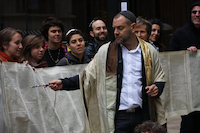 “Sabbath Queen.” At the most inclusive end of the spectrum, “Sabbath Queen,” a new film about Rabbi Amichai Lau-Lavie, is getting a lot of attention. Lau-Lavie, founder of LabShul, was ordained at JTS, but left the Conservative movement to officiate at weddings of interfaith couples. A review of the film says he advocates for “the need to leave tribalism without leaving Judaism.” It quotes Lau-Lavie as saying “It is necessary to move from the old paradigm of either/or to ‘yes and’… When you welcome someone fully, that person becomes part of the community. We must blur the old boundaries because it is practical and realistic.” He continues:
“Sabbath Queen.” At the most inclusive end of the spectrum, “Sabbath Queen,” a new film about Rabbi Amichai Lau-Lavie, is getting a lot of attention. Lau-Lavie, founder of LabShul, was ordained at JTS, but left the Conservative movement to officiate at weddings of interfaith couples. A review of the film says he advocates for “the need to leave tribalism without leaving Judaism.” It quotes Lau-Lavie as saying “It is necessary to move from the old paradigm of either/or to ‘yes and’… When you welcome someone fully, that person becomes part of the community. We must blur the old boundaries because it is practical and realistic.” He continues:
You love who you are now, in community with, or in a neighborhood with, or in relationship with, beyond the tribal boundaries that we grew up with. It’s not instead of who and where we are. It’s in addition to that. Either you stay behind your walls, or you meet people where they’re at, welcome them in, and keep Judaism thriving and expansive and inclusive. Keep it love-driven, not fear-based. It’s not everyone’s cup of tea. But there is no other recipe for survival.
Gary Rosenblatt explains that Lau-Lavie had hoped to change the Conservative movement’s policy on officiation “from within,” but after a “year of intense study of Jewish texts and in conversation with rabbis and congregants, he found a path he believed would enable him to officiate,” developing “a new form of wedding ceremony, incorporating certain Jewish rituals, preceded and followed by a commitment by the couple to study and engage in Jewish life.”
Rosenblatt writes about a scene in the film from a LabShul board meeting when, after Lau-Lavie said he planned to join the Rabbinical Assembly, a LabShul member said “’My family needs you,’ reminding him that he had created a community based on inclusivity.”
In “Welcoming the ‘Sabbath Queen’” Peter Fox, noting that Lau-Lavie left the movement because he chose to officiate at the wedding of a Jewish-Buddhist gay couples, put it more bluntly: ““It’s funny, because the gayness isn’t controversial. It’s the interfaithness … such a mindfuck, right?”
Interfaith families and antisemitism
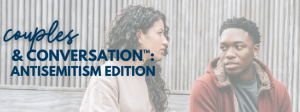 18Doors’ board chair, Laurie Beijen, and chief program officer, Adam Pollack, write that the increase in antisemitism has affected interfaith families in different ways than their Jewish-Jewish counterparts. Some partners from different faith backgrounds lack foundational knowledge about antisemitism; couples face communication challenges, with one partner feeling upset and unsupported and the other confused and unaware. The organization partnered with ADL to offer guides for interfaith families on how to identify, address and talk about antisemitism, and how to be an ally as a partner who is not Jewish, as well as spaces for couples to discuss their experiences. They conclude,
18Doors’ board chair, Laurie Beijen, and chief program officer, Adam Pollack, write that the increase in antisemitism has affected interfaith families in different ways than their Jewish-Jewish counterparts. Some partners from different faith backgrounds lack foundational knowledge about antisemitism; couples face communication challenges, with one partner feeling upset and unsupported and the other confused and unaware. The organization partnered with ADL to offer guides for interfaith families on how to identify, address and talk about antisemitism, and how to be an ally as a partner who is not Jewish, as well as spaces for couples to discuss their experiences. They conclude,
Despite the challenges unique to interfaith couples regarding antisemitism, there are also immense opportunities. Having family from different backgrounds allows for increased awareness, influence on opinions and the formation of a coalition of allies, ultimately leading to greater advocacy and safety for Jews and their loved ones.
Jack Wertheimer’s Latest
 Jack Wertheimer addresses the impact of October 7 and resurgent antisemitism on American Jews in “What American Jews Gave After October 7: An Accounting.” I don’t think he is aware of how negatively his comments about interfaith relationships come across. He says, “Jews in online discussion groups and other social media have described breakups with intimate partners who disagreed with them about the war; some have decided to swear off dating non-Jews as a result.” And “There even is evidence of a substantial increase in the numbers of non-Jews, many in relationships with Jews, who have been motivated by the resurgence of anti-Semitism to throw in their lot with Jews by converting to Judaism.” Noting that Employee Resource Groups are “attracting younger Jews between the ages of 35 and 45, many of whom are intermarried,” he adds, “Perhaps for the first time in their adult lives, they wish to connect with other Jews in some kind of collective effort.”
Jack Wertheimer addresses the impact of October 7 and resurgent antisemitism on American Jews in “What American Jews Gave After October 7: An Accounting.” I don’t think he is aware of how negatively his comments about interfaith relationships come across. He says, “Jews in online discussion groups and other social media have described breakups with intimate partners who disagreed with them about the war; some have decided to swear off dating non-Jews as a result.” And “There even is evidence of a substantial increase in the numbers of non-Jews, many in relationships with Jews, who have been motivated by the resurgence of anti-Semitism to throw in their lot with Jews by converting to Judaism.” Noting that Employee Resource Groups are “attracting younger Jews between the ages of 35 and 45, many of whom are intermarried,” he adds, “Perhaps for the first time in their adult lives, they wish to connect with other Jews in some kind of collective effort.”
Wertheimer says, “The question keeping professionals in the field up at night is how much of Jewish communal life can be sustained if the donor base continues to shrink.” Expressing negative attitudes about interfaith marriage is not likely to increase the donor base.
The December Holidays Are Coming
 Hey Alma’s advice columnist tackles Will I Confuse My Jewish Kid If We Celebrate Christmas. We definitely agree that in the family posing the question, celebrating Christmas wouldn’t confuse the child’s Jewish identity at all. But we weren’t sure about the unsolicited advice that encouraged the parents to share more of their own interfaith identities and backgrounds.
Hey Alma’s advice columnist tackles Will I Confuse My Jewish Kid If We Celebrate Christmas. We definitely agree that in the family posing the question, celebrating Christmas wouldn’t confuse the child’s Jewish identity at all. But we weren’t sure about the unsolicited advice that encouraged the parents to share more of their own interfaith identities and backgrounds.
I’m disappointed that the folks at Kveller and Hey Alma are talking about Chrismukkah. I’ve defended interfaith families from criticism because they celebrate both Christmas and Hanukkah for over twenty years, while also saying that “Chrismukkah Is a Bad Idea.” Celebrating each distinct holiday doesn’t mean mushing them together – even if they fall at the same time.
Celebrities
Martha Stewart on what things were like in 1961: “I went home and told my dad [about the engagement], and my dad slapped me. And he slapped me hard on my face and said, ‘No, you’re not marrying him. He’s a Jew.’ I remember getting that slap.”
The Forward’s Benyamin Cohen asks, “Is Seth Meyers Jewish? His wife, kids and jokes are.” Cohen reports that “Over the years, he’s become ‘Jewish enough’ for his in-laws.” He believes “that’s the only religion that that happens in. Which is why it’s great that it’s the only religion that ends with -ish.” I say it doesn’t matter whether he’s formally Jewish or not.
In Other News
- Interfaith Work and Interfaith Families: A Toolkit is a new resource created by Susan Katz Miller and Dalia El Ariny, for interfaith families and multiple religious practicioners, organizations that work with them, and scholars who conduct research about them.
- Our friend Marion Usher was the scholar in residence at Indianapolis Hebrew Congregation. You can watch her initial presentation here.
- News from Israel: ynet reports that “The Reform movement converted 303 people in Israel last year, a record number compared to previous years, which is about 17% of the aggregate converts in Israel during this period.”
- The Jewish News Service chose to highlight, from new research presented by the UJA-Federation of New York, that “Sephardic and Mizrachi New Yorkers … have lower intermarriage rates … than the overall New York Jewish population.”
- Finally, a really wonderful story: “How My Southern Interfaith Family Pulled Together the Perfect Bat Mitzvah.”

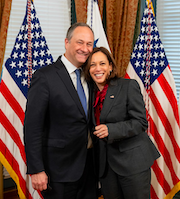 Tamkin quotes Rabbi Lex Rofeberg as saying that HUC’s decision to admit rabbinic students in interfaith relationships was “a bigger deal” than Emhoff’s convention speech, because it counters the way interfaith relationships are besieged or attacked in Jewish spaces. Andrew Rehfeld is then quoted as saying that the new policy is recognition of a shift in American Jewish life with many interfaith families deeply engaged. He makes the point, echoed by the USCJ’s Keren McGinity, that partners from different faith backgrounds can result in deeper commitments from their Jewish partners.
Tamkin quotes Rabbi Lex Rofeberg as saying that HUC’s decision to admit rabbinic students in interfaith relationships was “a bigger deal” than Emhoff’s convention speech, because it counters the way interfaith relationships are besieged or attacked in Jewish spaces. Andrew Rehfeld is then quoted as saying that the new policy is recognition of a shift in American Jewish life with many interfaith families deeply engaged. He makes the point, echoed by the USCJ’s Keren McGinity, that partners from different faith backgrounds can result in deeper commitments from their Jewish partners. Hadara Ishak, president of the
Hadara Ishak, president of the 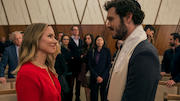 The just released Netflix series, “Nobody Wants This,” about a “hot” rabbi played by Adam Brody, dating a woman who’s not Jewish played by Kristen Bell, is getting a lot of attention. Benyamin Cohen wrote a nice
The just released Netflix series, “Nobody Wants This,” about a “hot” rabbi played by Adam Brody, dating a woman who’s not Jewish played by Kristen Bell, is getting a lot of attention. Benyamin Cohen wrote a nice  Attitudes and policies are changing, as evidenced most recently by the HUC decision to admit students in interfaith relationships, which was the subject of a nice
Attitudes and policies are changing, as evidenced most recently by the HUC decision to admit students in interfaith relationships, which was the subject of a nice  It caught my eye when, after saying that same-sex marriage is incompatible with halacha, Rabbi Brick says that the “follow up” is that “if you love them you’re going to do their wedding, and if you won’t do their wedding, you don’t love them.” This reminded me of Noah Feldman saying in his
It caught my eye when, after saying that same-sex marriage is incompatible with halacha, Rabbi Brick says that the “follow up” is that “if you love them you’re going to do their wedding, and if you won’t do their wedding, you don’t love them.” This reminded me of Noah Feldman saying in his  In an unexpected TV episode discussion this month, covered in the
In an unexpected TV episode discussion this month, covered in the  I am apparently the unnamed “HUC critic” in Dr. Steven Windmueller’s essay,
I am apparently the unnamed “HUC critic” in Dr. Steven Windmueller’s essay,  In
In  Finally, at an even more progressive end of the spectrum, we have
Finally, at an even more progressive end of the spectrum, we have 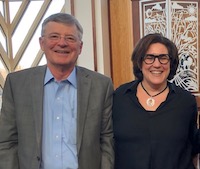 On June 18, 18Doors announced that Jodi Bromberg was stepping down as CEO, and a national search to fill her position was underway. As the founder of what used to be known as InterfaithFamily, I care a great deal about the ongoing health and growth the organization. I hired Jodi to be my successor and I have always thought she did a great job of maintaining the organization and keeping it going. I didn’t agree with every change, but the website and officiation referral service are tremendously improved, the Rukin Rabbinic Fellowship is a jewel, and she built a strong and engaged board.
On June 18, 18Doors announced that Jodi Bromberg was stepping down as CEO, and a national search to fill her position was underway. As the founder of what used to be known as InterfaithFamily, I care a great deal about the ongoing health and growth the organization. I hired Jodi to be my successor and I have always thought she did a great job of maintaining the organization and keeping it going. I didn’t agree with every change, but the website and officiation referral service are tremendously improved, the Rukin Rabbinic Fellowship is a jewel, and she built a strong and engaged board. There was a second annual Re-charging Reform conference this month, where most of the discussion understandably was
There was a second annual Re-charging Reform conference this month, where most of the discussion understandably was  The URJ website had a nice
The URJ website had a nice  We’ve expressed before the hope that “peoplehood” will be understood to include partners from different faith backgrounds, as well as their families. Our group under threat needs to be as broad as possible, with as many allies as possible.
We’ve expressed before the hope that “peoplehood” will be understood to include partners from different faith backgrounds, as well as their families. Our group under threat needs to be as broad as possible, with as many allies as possible. This article in the New York Times, “
This article in the New York Times, “ Last month we
Last month we 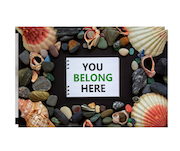 “
“ The UK Institute of Jewish Policy Research issued a new
The UK Institute of Jewish Policy Research issued a new  The Center is proud to have signed up to be a distribution
The Center is proud to have signed up to be a distribution  The UK Institute for Jewish Policy Research issued a new
The UK Institute for Jewish Policy Research issued a new 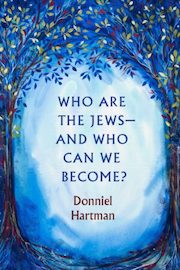 In his new book,
In his new book,